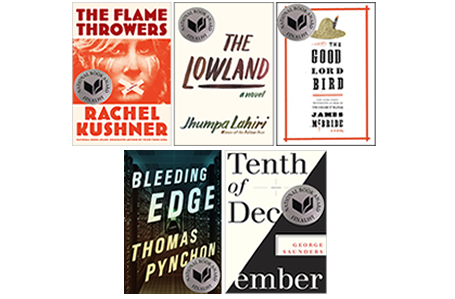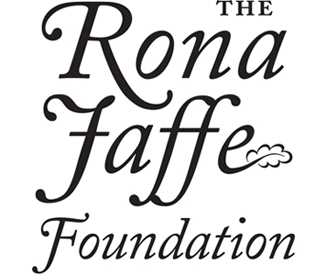Why Writing Fiction Is So Difficult
Author Jonathan Safran Foer discusses the difficulties of writing, his faith in the creative process, and what makes a book "good."
Jump to navigation Skip to content
Author Jonathan Safran Foer discusses the difficulties of writing, his faith in the creative process, and what makes a book "good."
The Whiting Writers’ Awards, given annually by the Mrs. Giles Whiting Foundation to ten emerging writers who show “exceptional talent and promise in early career,” were announced on Monday. Each writer will receive the $50,000.
The 2013 winners are Hannah Dela Cruz Abrams, a fiction and nonfiction writer whose novella, The Man Who Danced with Dolls, was published in 2012 by Madras Press; Amanda Coplin, a fiction writer whose first novel, The Orchardist, was published by HarperCollins in 2012; Jennifer duBois, a fiction writer whose debut novel, A Partial History of Lost Causes, was published by Dial Press in 2012, and whose newest novel, Cartwheel, was published in September by Random House; Virginia Grise, the author of several plays including Making Myth; Ishion Hutchinson, a poet whose debut collection, Far District, was published by Peepal Tree Press Limited in 2010; Morgan Meis, a nonfiction writer whose collection of essays, Ruins, was published by Fallen Bros Press in 2012; C. E. Morgan, a fiction writer whose first novel, All the Living, was published by Farrar, Straus & Giroux in 2009; Rowan Ricardo Phillips, a poet whose first collection, The Ground, was published by Farrar Straus & Giroux in 2012; Clifford Thompson, a fiction and nonfiction writer whose essay collection, Love for Sale, was published this year by Autumn House Press; and Stephanie Powell Watts, a fiction writer whose debut story collection, We Are Taking Only What We Need, was published in 2012 by BkMk Press.
The Whiting Awards honor works in the categories of poetry, fiction, nonfiction, and plays, and are intended to identify writers “who have yet to make their mark on the literary culture.'’
Since 1985, the Mrs. Giles Whiting Writing Foundation has given over $6 million to 290 writers. Visit the website to learn more about this year's winners.
The National Book Foundation announced the finalists for its annual National Book Awards this week. The selection of finalists follows last month’s longlist announcement, the first time in the foundation’s sixty-four-year history that such a list has been published.
The finalists in fiction are Rachel Kushner, The Flamethrowers (Scribner); Jhumpa Lahiri, The Lowland (Knopf); James McBride, The Good Lord Bird (Riverhead); Thomas Pynchon, Bleeding Edge (Penguin); and George Saunders, Tenth of December (Random House).
 The finalists in poetry are Frank Bidart, Metaphysical Dog (Farrar, Straus and Giroux); Lucie Brock-Broido, Stay, Illusion (Knopf); Adrian Matejka, The Big Smoke (Penguin); Matt Rasmussen, Black Aperture (Louisiana State University Press); and Mary Szybist, Incarnadine (Graywolf Press).
The finalists in poetry are Frank Bidart, Metaphysical Dog (Farrar, Straus and Giroux); Lucie Brock-Broido, Stay, Illusion (Knopf); Adrian Matejka, The Big Smoke (Penguin); Matt Rasmussen, Black Aperture (Louisiana State University Press); and Mary Szybist, Incarnadine (Graywolf Press).
The finalists in nonfiction are Jill Lepore, Book of Ages: The Life and Opinions of Jane Franklin (Knopf); Wendy Lower, Hitler’s Furies: German Women in the Nazi Killing Fields (Houghton Mifflin Harcourt); George Packer, The Unwinding: An Inner History of the New America (Farrar, Straus and Giroux); Alan Taylor, The Internal Enemy: Slavery and War in Virginia, 1772-1832 (Norton); and Lawrence Wright, Going Clear: Scientology, Hollywood, & the Prison of Belief (Knopf).
Also new from the foundation is The Contenders: Excerpts from the 2013 National Book Award Finalists, a free National Book Award eBook series available for download from the foundation’s website in a variety of formats.
Visit the website to read more about the finalists, and to see the selections in the category of young people’s literature. Selections in each of the four categories were made by a panel of judges comprised of five writers and literary professionals.
The winners will be announced at the sixty-fourth annual National Book Awards Benefit Dinner and Ceremony in New York City on November 20, which will be streamed live on the Foundation’s website. Winners will receive $10,000; all finalists will receive $1,000.
People often collect strange things for unknown reasons: ceramic elves from Europe, antique trout fishing lures, bamboo backscratchers from around the world. What we collect often reveals our idiosyncrasies, and therefore our true natures. Recall someone in your life who collected something intriguing or odd. Try to define the attraction, and in the process, bring that person to life.
Our homes are extensions of our souls: the vibrant oil painting of a French villa hanging in the dining room, the tattered couch stained by a child’s bowl of ice cream in the den, the dead, blackened peace lily on an empty bookshelf. Write about the home you were raised in. Focus on the decorations, the furniture, and the items that reveal the most about the people who lived among them. In our homes, everything means something.
Author Michael Lennon discusses his biography, Norman Mailer: A Double Life, in which he explores Mailer’s writing techniques, literary influences, and legendary grudges.
The Rona Jaffe Foundation has announced the winners of its nineteenth annual Writers’ Awards, given to emerging women writers. The program offers grants of $30,000 each to writers of poetry, fiction, and creative nonfiction.
The 2013 winners are fiction and nonfiction writer Tiffany Briere of San Diego, California; fiction writer Ashlee Crews of Durham, North Carolina; nonfiction writer Kristin Dombek of Brooklyn, New York; poet Margaree Little of Tuscon, Arizona; fiction writer Kirstin Valdez Quade of Palo Alto, California; and nonfiction writer Jill Sisson Quinn of Scandinavia, Wisconsin. Visit the website for the winners’ complete bios.
 The Rona Jaffe Foundation Writers’ Awards program was established by author Rona Jaffe in 1995 “in recognition of the special contributions women writers make to our culture and society.” Since the program began, the Foundation has awarded more than $1.5 million to women writers in the early stages of their careers. Past recipients have included Rachel Aviv, Eula Biss, Lan Samantha Chang, Rivka Galchen, ZZ Packer, Sharifa Rhodes-Pitts, and Tracy K. Smith. In addition to providing time to write, the program also offers assistance for things like research, travel, and child care. Nominations for the annual awards are solicited by the Foundation from writers, editors, critics, and other literary professionals.
The Rona Jaffe Foundation Writers’ Awards program was established by author Rona Jaffe in 1995 “in recognition of the special contributions women writers make to our culture and society.” Since the program began, the Foundation has awarded more than $1.5 million to women writers in the early stages of their careers. Past recipients have included Rachel Aviv, Eula Biss, Lan Samantha Chang, Rivka Galchen, ZZ Packer, Sharifa Rhodes-Pitts, and Tracy K. Smith. In addition to providing time to write, the program also offers assistance for things like research, travel, and child care. Nominations for the annual awards are solicited by the Foundation from writers, editors, critics, and other literary professionals.
Rona Jaffe (1931–2005) was the author of sixteen books, including Class Reunion, Family Secrets, The Road Taken, and The Room-Mating Season. Her 1958 bestselling debut novel, The Best of Everything, was reissued by Penguin in 2005.
Listen to a podcast of the 2013 winners reading from their work during a recent awards ceremony at New York University.
We all have scars. Though most do not conjure welcome memories, scars are an important part of our lives—both physically and metaphorically. Scars reveal our vulnerability and human frailty, but also represent our resilience and toughness. Write about a scar you have, how you got it, and what it means to you.
Georgetown Review, the literary magazine of the Georgetown, Kentucky–based Georgetown College, is currently accepting submissions to its annual magazine contest. A prize of $1,000 and publication is given for a poem, a short story, or an essay. The deadline is October 15.
Submit a poem, a short story, or an essay of any length with a $10 entry fee ($5 for each additional entry) online via Submittable, or by mail to Georgetown Review, 400 East College Street, Box 227, Georgetown, KY 40324.
The magazine’s editors will judge. Winners will be announced on the Georgetown Review website in February 2014. To have work returned, or to receive the winner announcement by mail, include a self-addressed stamped envelope with paper submissions. Colleagues, friends, and students of the editors are ineligible. All entries are considered for publication.
Georgetown Review also sponsors an annual short story collection contest for a book of stories or novellas; and a poetry manuscript contest, which will be judged this year by Ada Limón. General submissions are read between September 1 and December 31.
Visit the website to read excerpts of work published in the current issue, including Lisa Lenzo’s Strays, which won the 2013 contest.
"Censorship is the enemy of truth." Bill Moyers discusses what books and libraries have meant to his life, and expresses his dismay and frustration over the prejudices that motivate others to ban books.